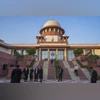Govt to take call: Supreme Court on SC/ST creamy layer, sub-categorisation
The apex court emphasised that the responsibility to act on this rests with the legislature and the executive
)
(Photo: PTI)
Listen to This Article
The Supreme Court of India has reiterated its reservations about directing governments to implement its landmark August 2024 ruling. This ruling aims to bar individuals from the “creamy layer” within the Scheduled Castes (SC) and Scheduled Tribes (ST) categories from availing reservation benefits and to allow sub-categorisation within SC/ST groups to extend these benefits to the most disadvantaged.
However, the court, given on Thursday (January 9), emphasised that the responsibility to act on this rests with the legislature and the executive, as reported by The Times of India.
Despite the court's guidance, governments across India have been reluctant to address this contentious issue. Dominant sections within Dalit communities have strongly opposed the sub-categorisation of SC/STs, complicating its implementation. This resistance led an aggrieved petitioner from Madhya Pradesh to approach the Supreme Court, seeking a directive to enforce the ruling in state-level recruitment processes.
Advocate Siddharth Gupta, representing the petitioner, argued that all government departments and public sector undertakings (PSUs) should immediately stop extending reservation benefits to individuals within the creamy layer of SC/ST communities.
Responding to the plea, a bench comprising Justices BR Gavai and Augustine George Masih clarified the judiciary's limitations in enforcing policy changes. “We have given our view that taking into consideration the experience of the past 75 years, such persons who have already availed benefits and are in a position to compete with others, should be excluded from reservation. But it is a call to be taken by executive and legislature,” the bench said.
Also Read
The court also highlighted Attorney General R Venkataramani's argument that the judiciary should refrain from interfering in policy matters. Justice Gavai emphasised that legislators hold the power to enact laws addressing this issue, suggesting that it is up to elected representatives to take the necessary steps.
The landmark 2024 ruling
Justice Gavai, who was part of the seven-judge bench that delivered the transformative August 2024 judgment, had emphasised the need for a mechanism to identify and exclude the creamy layer within SC/ST communities. He argued that the principle of excluding the creamy layer among OBCs cannot simply be applied to SC/STs without tailored policies.
“The state must devise a policy to identify the creamy layer among SCs and STs and exclude them from affirmative action. This is the only way to achieve the real equality guaranteed by the Constitution,” Justice Gavai had stated.
The then Chief Justice of India DY Chandrachud, along with Justices Vikram Nath, Pankaj Mithal, Manoj Misra, and SC Sharma, concurred with Justice Gavai's views.
In his remarks, Justice Gavai drew attention to the stark contrasts within SC/ST communities. He explained that individuals who have benefited from reservations to secure positions such as peons or sweepers remain socially and economically disadvantaged. However, those who have climbed to higher positions in society no longer require the same support.
“Those who have reached high echelons in life after availing reservations cannot continue to claim they are socially and economically backward. At this stage, they should voluntarily step aside from special provisions and allow others in need to benefit,” Justice Gavai had said.
More From This Section
Don't miss the most important news and views of the day. Get them on our Telegram channel
First Published: Jan 11 2025 | 10:27 AM IST